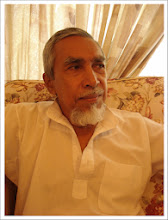1. Recently a young employee had made a
statutory declaration alleging that his boss attempted to sexually assault him.
I found it hard to believe that the boss would face the same situation again
that in the past had him charged, tried and found guilty of sexual assaults on
two occasions. What is mind-boggling is that the boss is an eminent political figure
in the country. In the following account I will refer to him as “the pied
piper.”
2. In my youth, I used to idolise the pied
piper, a charismatic figure, and saw in him a promising future leader for the
country, but it was not until 1975 that for the first time I heard someone made
derogatory remark about his behaviour. The remark came from a colleague of mine
who became a close friend during a one-year specialist course in art education
that we attended at STTI, Cheras. It was a coincidence that the pied piper was
his peer at a prestigious elite school in Kuala Kangsar, Perak.
3. Later in 1979 I went for my first degree at
the oldest university in the country where I saw disgusting name-calling
scribbled at the back of toilet doors that was directed at the pied piper. That
brought to mind my colleague’s remark about his behaviour four years back.
Consequently, I began to wonder if there could be smoke without fire.
4. During the outbreak of political unrest in
September 1998, the controversy of a political decision made by the then prime
minister became the ubiquitous topic of conversation across the country. It was
at that time that a friend related an account that had happened in the early
1970s when he was working in Baling. It happened that one day he was listening
to the pied piper delivering a fiery speech to a crowd in an open place hitting
out at the ruling government. As he listened intently, a friend came up to him
and said if it were worthwhile listening to one who had a darker side to his
character. The friend of my friend, also a peer of the pied piper, went to the
same above-mentioned school in Perak.
5. There are other accounts including
comments on social media relating to the strange behaviour of the pied piper
that undoubtedly have proven detrimental to his public image, but curiously
enough not challenged in court. At present the pied piper is still fighting for
his survival on the political scene in spite of the controversies shrouding his
image.
6. In certain countries politicians readily step down at the slightest hint of corruption or wrongdoing. So I wonder why the pied piper is so intent in pursuing his course of action. Does he really believe or want people to believe that he is the victim of slander? There do seem to be some grounds to suspect his honesty because he remains evasive about his strange behaviour. The story of the pied piper is a tragedy in itself. He puts the general public in a great dilemma. The people are in limbo while waiting what might come next. I for one believe that it is unethical to have a hypocrite for a leader.
6. In certain countries politicians readily step down at the slightest hint of corruption or wrongdoing. So I wonder why the pied piper is so intent in pursuing his course of action. Does he really believe or want people to believe that he is the victim of slander? There do seem to be some grounds to suspect his honesty because he remains evasive about his strange behaviour. The story of the pied piper is a tragedy in itself. He puts the general public in a great dilemma. The people are in limbo while waiting what might come next. I for one believe that it is unethical to have a hypocrite for a leader.














